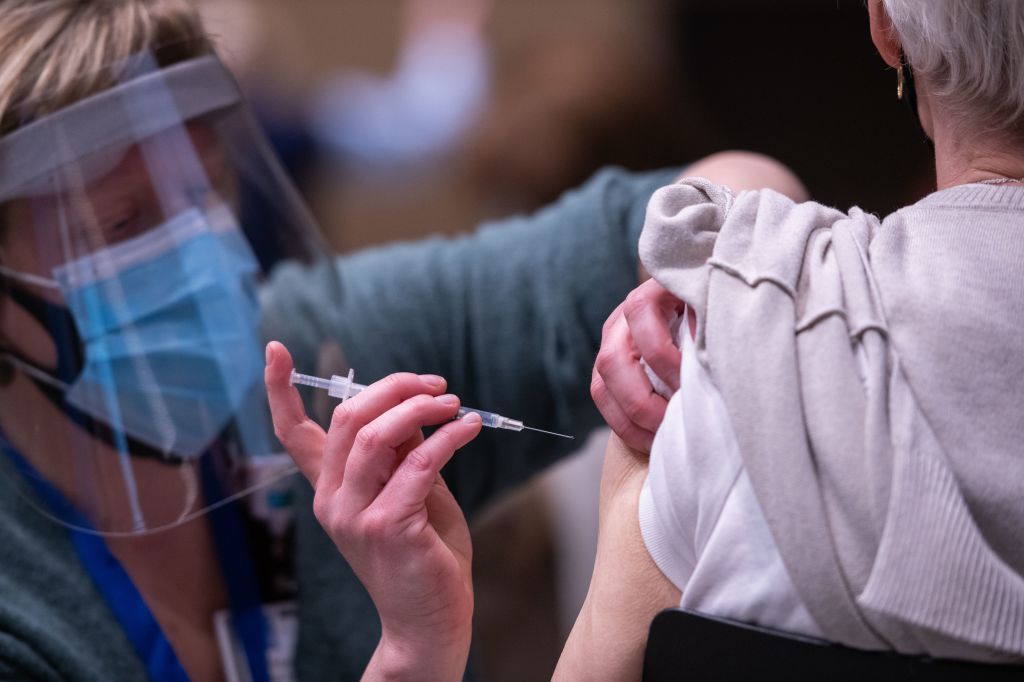3 reasons West Virginia's COVID-19 vaccination effort is working so well


A free daily email with the biggest news stories of the day – and the best features from TheWeek.com
You are now subscribed
Your newsletter sign-up was successful
West Virginia is doing better than probably any other state in vaccinating its population against COVID-19. About 9 percent of West Virginians have already gotten their first dose, better than any state but Alaska, and West Virginia is No. 1 in giving out second doses, The New York Times reports. West Virginia has used 83 percent of the doses allocated to the state, by far the highest percentage.
Part of West Virginia's success is its size: With 1.8 million residents, its population is smaller than several U.S. cities. But the state's population is also older and less healthy than average. "People are dying every day," Albert Wright Jr., CEO of WVU Medicine, the state's largest health-care provider, told the Times. "We just realized, the only way out of this is to vaccinate our way out." The Times highlights three decisions that put West Virginia "at the top of the charts," as former FDA chief Dr. Mark McClellan said:
1. No to the feds: West Virginia decided early on to opt out of a federal program that relied on Walgreens and CVS to vaccinate people in nursing homes and long-term car facilities. Instead, West Virginia created a network of local pharmacies and nursing homes, to great success. "Using your local partners and really having more control over where the vaccine is going, that's what has been successful for West Virginia," Association of Immunization Managers chief Claire Hannan told the Times.
The Week
Escape your echo chamber. Get the facts behind the news, plus analysis from multiple perspectives.

Sign up for The Week's Free Newsletters
From our morning news briefing to a weekly Good News Newsletter, get the best of The Week delivered directly to your inbox.
From our morning news briefing to a weekly Good News Newsletter, get the best of The Week delivered directly to your inbox.
2. Yes to the National Guard: West Virginia also put the National Guard at the center of its vaccination effort, a step other states have started taking amid slow rollouts. The National Guard "are logistical experts," said Jim Kranz, a vice president at the West Virginia Hospital Association.
3. Only promise what you have: West Virginia, after some mishaps, has also decided to require appointments for people to get vaccinated, and the state won't set up such appointments until they have the vaccines sitting in their own freezers. Other states have over-promised, only to have to cancel appointments when the vaccine ran out.
West Virginia's biggest hurdle now is the scarcity of vaccine supply, something it has no control over. The federal government is expecting hundreds of millions of more doses in the next few months. Read more about West Virginia's success at The New York Times.
A free daily email with the biggest news stories of the day – and the best features from TheWeek.com
Peter has worked as a news and culture writer and editor at The Week since the site's launch in 2008. He covers politics, world affairs, religion and cultural currents. His journalism career began as a copy editor at a financial newswire and has included editorial positions at The New York Times Magazine, Facts on File, and Oregon State University.
-
 Local elections 2026: where are they and who is expected to win?
Local elections 2026: where are they and who is expected to win?The Explainer Labour is braced for heavy losses and U-turn on postponing some council elections hasn’t helped the party’s prospects
-
 6 of the world’s most accessible destinations
6 of the world’s most accessible destinationsThe Week Recommends Experience all of Berlin, Singapore and Sydney
-
 How the FCC’s ‘equal time’ rule works
How the FCC’s ‘equal time’ rule worksIn the Spotlight The law is at the heart of the Colbert-CBS conflict
-
 TikTok secures deal to remain in US
TikTok secures deal to remain in USSpeed Read ByteDance will form a US version of the popular video-sharing platform
-
 Unemployment rate ticks up amid fall job losses
Unemployment rate ticks up amid fall job lossesSpeed Read Data released by the Commerce Department indicates ‘one of the weakest American labor markets in years’
-
 US mints final penny after 232-year run
US mints final penny after 232-year runSpeed Read Production of the one-cent coin has ended
-
 Warner Bros. explores sale amid Paramount bids
Warner Bros. explores sale amid Paramount bidsSpeed Read The media giant, home to HBO and DC Studios, has received interest from multiple buying parties
-
 Gold tops $4K per ounce, signaling financial unease
Gold tops $4K per ounce, signaling financial uneaseSpeed Read Investors are worried about President Donald Trump’s trade war
-
 Electronic Arts to go private in record $55B deal
Electronic Arts to go private in record $55B dealspeed read The video game giant is behind ‘The Sims’ and ‘Madden NFL’
-
 New York court tosses Trump's $500M fraud fine
New York court tosses Trump's $500M fraud fineSpeed Read A divided appeals court threw out a hefty penalty against President Trump for fraudulently inflating his wealth
-
 Trump said to seek government stake in Intel
Trump said to seek government stake in IntelSpeed Read The president and Intel CEO Lip-Bu Tan reportedly discussed the proposal at a recent meeting
